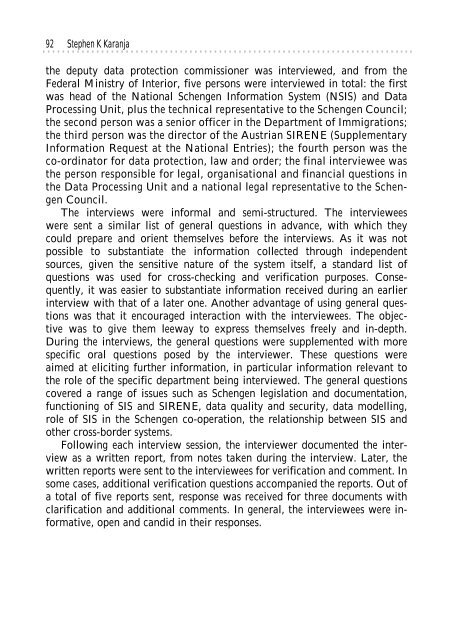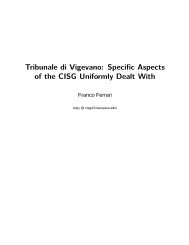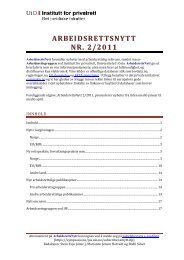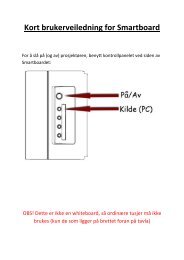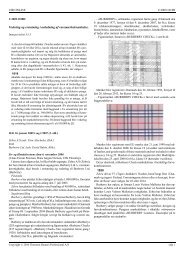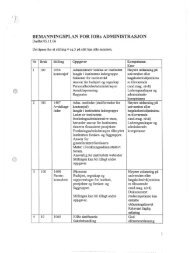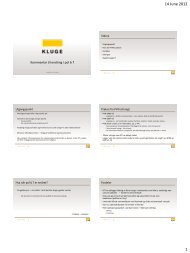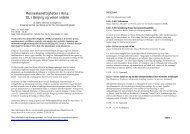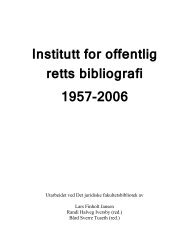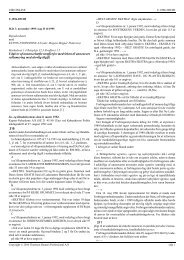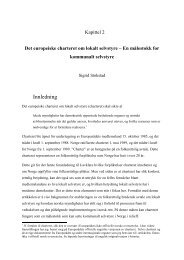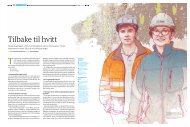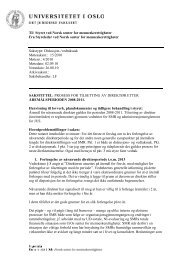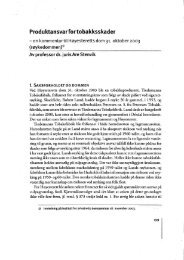Lee A. Bygrave (red.) YULEX 2002 - Universitetet i Oslo
Lee A. Bygrave (red.) YULEX 2002 - Universitetet i Oslo
Lee A. Bygrave (red.) YULEX 2002 - Universitetet i Oslo
You also want an ePaper? Increase the reach of your titles
YUMPU automatically turns print PDFs into web optimized ePapers that Google loves.
............................................................................<br />
92 Stephen K Karanja<br />
the deputy data protection commissioner was interviewed, and from the<br />
Federal Ministry of Interior, five persons were interviewed in total: the first<br />
was head of the National Schengen Information System (NSIS) and Data<br />
Processing Unit, plus the technical representative to the Schengen Council;<br />
the second person was a senior officer in the Department of Immigrations;<br />
the third person was the director of the Austrian SIRENE (Supplementary<br />
Information Request at the National Entries); the fourth person was the<br />
co-ordinator for data protection, law and order; the final interviewee was<br />
the person responsible for legal, organisational and financial questions in<br />
the Data Processing Unit and a national legal representative to the Schengen<br />
Council.<br />
The interviews were informal and semi-structu<strong>red</strong>. The interviewees<br />
were sent a similar list of general questions in advance, with which they<br />
could prepare and orient themselves before the interviews. As it was not<br />
possible to substantiate the information collected through independent<br />
sources, given the sensitive nature of the system itself, a standard list of<br />
questions was used for cross-checking and verification purposes. Consequently,<br />
it was easier to substantiate information received during an earlier<br />
interview with that of a later one. Another advantage of using general questions<br />
was that it encouraged interaction with the interviewees. The objective<br />
was to give them leeway to express themselves freely and in-depth.<br />
During the interviews, the general questions were supplemented with more<br />
specific oral questions posed by the interviewer. These questions were<br />
aimed at eliciting further information, in particular information relevant to<br />
the role of the specific department being interviewed. The general questions<br />
cove<strong>red</strong> a range of issues such as Schengen legislation and documentation,<br />
functioning of SIS and SIRENE, data quality and security, data modelling,<br />
role of SIS in the Schengen co-operation, the relationship between SIS and<br />
other cross-border systems.<br />
Following each interview session, the interviewer documented the interview<br />
as a written report, from notes taken during the interview. Later, the<br />
written reports were sent to the interviewees for verification and comment. In<br />
some cases, additional verification questions accompanied the reports. Out of<br />
a total of five reports sent, response was received for three documents with<br />
clarification and additional comments. In general, the interviewees were informative,<br />
open and candid in their responses.


